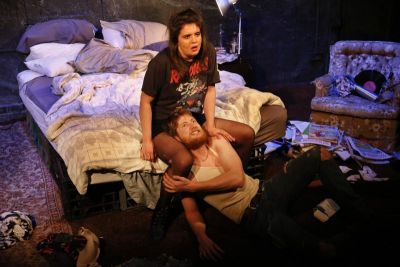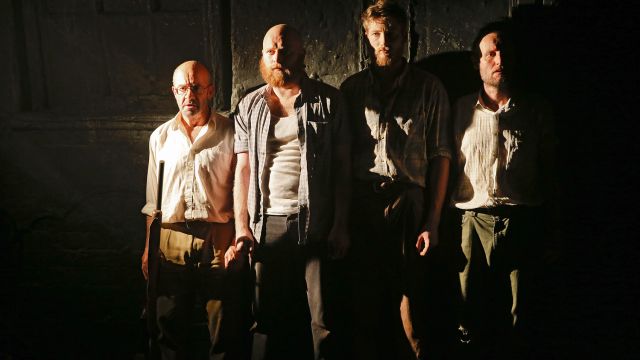The Absence of Knowing: Four Men and Dog Play
This strikingly original production of two short plays by Belgian writer Elvis Peeters is by theatre veteran and award winner Richard Murphet. Elvis Peeters’ texts supply no scene setting and no directions. The writing is powerful, but the texts are no more than intertwining and juxtaposed monologues. There is very little interaction between the characters – at least on the page. It is up to the director what he or she does with this. What Mr Murphet does is inventive, to say the least; it is also visually and aurally powerful – close to overwhelming. He could have simply lined up his cast and had them take it in turns to address the audience. The text per se is powerful enough. We’ve seen that solution (telling the story) in other plays elsewhere, but Mr Murphet gives us so much more.
The first piece, The Absence of Knowing: Four Men, begins with a voice and the sounds of a fierce storm coming out of total darkness, which holds until it becomes almost unbearable, plunging us into a shared experience – which, perhaps, we’d rather not have. The voice will turn out to be that of Cas, the doctor (Rob Meldrum), telling us of a search party in the most hostile of places. Then a cross light, like the last horizon fade of sunlight, reveals four dirty and desperate men hauling on a rope, working together, an image soon drenched in irony. Under them, a carpet of dirt that will turn to mud. Their costumes and weapons are, we guess, late 19th or early 20th century and there, on the tiny La Mama stage, we are with them on some hostile, wind-scoured plain, a blasted heath – where too soon it is dark again. The darkness is, of course, a metaphor too.
 The men are, besides the doctor, AD the sailor (Tim Wotherspoon), Vic the friend ((Tom Dent) and Jeff the guide (Jackson Trickett). They are a search party, a posse after a rapist, a man who raped the doctor’s sister, Anna (Emma Tufrey Smith) back in the insignificant, flea-bitten village from which they set out. They are exhausted, but they blunder on; they want vengeance; they want to prove, in this God-forsaken place, that they are men – protectors of honour. Three of them do not know that the rapist is among them: what better place to hide? Their horses shy in terror, their pack animal mule is almost blown away. We believe there are horses and a mule, though all we see are ropes and saddles. Back in the village, Anna, no victim, mocks their manly endeavours: she is not broken – violated perhaps, but not destroyed.
The men are, besides the doctor, AD the sailor (Tim Wotherspoon), Vic the friend ((Tom Dent) and Jeff the guide (Jackson Trickett). They are a search party, a posse after a rapist, a man who raped the doctor’s sister, Anna (Emma Tufrey Smith) back in the insignificant, flea-bitten village from which they set out. They are exhausted, but they blunder on; they want vengeance; they want to prove, in this God-forsaken place, that they are men – protectors of honour. Three of them do not know that the rapist is among them: what better place to hide? Their horses shy in terror, their pack animal mule is almost blown away. We believe there are horses and a mule, though all we see are ropes and saddles. Back in the village, Anna, no victim, mocks their manly endeavours: she is not broken – violated perhaps, but not destroyed.
The effect of the narrative and the way it is presented are visceral. Mr Meldrum, a shorter man in scholarly spectacles, gives us a frightened man who does not belong there, but must be there. Mr Wotherspoon is burly, bald and bushy bearded, a frightening presence. Mr Trickett’s Jeff the guide doesn’t say much; he’s watchful, he’s curiously detached, as if to say, ‘If you really must do this, I’ll show you where…’ Mr Dent, the ‘friend’, is an ambiguous and ambivalent figure, with secrets of his own.
If I emphasise the visual here it’s because that is so much of Mr Murphet’s achievement. He gives us indelible images, not for their own sake, but in support of and made inseparable from the text.
Another layer of that text, emphasised by the images, is that such a place reduces human feeling to meaningless, it becomes a moral vacuum – like Kurtz’s outpost in Heart of Darkness.
 The second piece, Dog Play, is perhaps simpler but no less visceral. It is a two-hander. There is a Woman (Emma Tufrey Smith) and a Man (Jackson Trickett) locked in a struggle for domination. To be glib and reductive, it is ‘the battle of the sexes’. Here the images are more contemporary: these are street people in ragged, grubby clothing, holed up somewhere, f**king themselves into oblivion. Their struggle is fierce, bloody and to the death. It’s Strindberg with no euphemisms.
The second piece, Dog Play, is perhaps simpler but no less visceral. It is a two-hander. There is a Woman (Emma Tufrey Smith) and a Man (Jackson Trickett) locked in a struggle for domination. To be glib and reductive, it is ‘the battle of the sexes’. Here the images are more contemporary: these are street people in ragged, grubby clothing, holed up somewhere, f**king themselves into oblivion. Their struggle is fierce, bloody and to the death. It’s Strindberg with no euphemisms.
The Man wants – needs – to know all and to control her and he’ll do it between her legs. He’ll f**k her into submission. She laughs at him. His need is tearing him apart. Mr Trickett’s Man is obsessed: he twists and shivers and contorts like a man with delirium tremens or in the throes of ice withdrawal. It’s a riveting performance – both desperation and pathos together. He will lose. He will always lose. He wants to know the Unknowable, so as to possess the Woman completely, but the Unknowable will always be unknowable (and an illusion, anyway) because no matter what he does and no matter how often or how violent or how cruel, the Woman will not yield and will withhold her mysterious self. Ms Smith portrays with great strength this Woman who remains unattainable and inviolate.
The contributions of Mr Murphet’s collaborators here are essential. Roger Alsop’s sound design, particularly in Four Men, hugely enhances the desolation and the inexorable force of Nature. Khris Chaney’s lighting is all sharp, piercing rays and then murk as the men tread warily around each other. Above all, however, these two pieces are Mr Murphet’s and his actors’ achievements. They have done a lot more than ‘realise’ the texts: they have made the texts their own and created their own works of art.
Michael Brindley
Photographer: Jeff Busby.
Subscribe to our E-Newsletter, buy our latest print edition or find a Performing Arts book at Book Nook.

